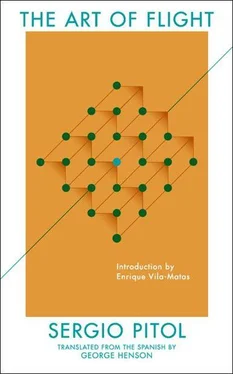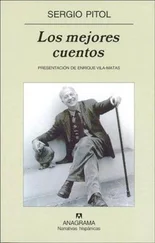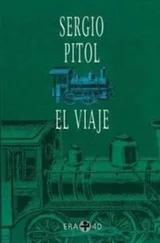Sergio Pitol - The Art of Flight
Здесь есть возможность читать онлайн «Sergio Pitol - The Art of Flight» весь текст электронной книги совершенно бесплатно (целиком полную версию без сокращений). В некоторых случаях можно слушать аудио, скачать через торрент в формате fb2 и присутствует краткое содержание. Год выпуска: 2015, Издательство: Deep Vellum, Жанр: Современная проза, на английском языке. Описание произведения, (предисловие) а так же отзывы посетителей доступны на портале библиотеки ЛибКат.
- Название:The Art of Flight
- Автор:
- Издательство:Deep Vellum
- Жанр:
- Год:2015
- ISBN:нет данных
- Рейтинг книги:5 / 5. Голосов: 1
-
Избранное:Добавить в избранное
- Отзывы:
-
Ваша оценка:
- 100
- 1
- 2
- 3
- 4
- 5
The Art of Flight: краткое содержание, описание и аннотация
Предлагаем к чтению аннотацию, описание, краткое содержание или предисловие (зависит от того, что написал сам автор книги «The Art of Flight»). Если вы не нашли необходимую информацию о книге — напишите в комментариях, мы постараемся отыскать её.
The first work in Pitol's "Trilogy of Memory," The Art of Flight imaginatively blends the genres of fiction and memoir in a Borgesian swirl of contemplation and mystery, expanding our understanding and appreciation of what literature can be and what it can do.
The Art of Flight — читать онлайн бесплатно полную книгу (весь текст) целиком
Ниже представлен текст книги, разбитый по страницам. Система сохранения места последней прочитанной страницы, позволяет с удобством читать онлайн бесплатно книгу «The Art of Flight», без необходимости каждый раз заново искать на чём Вы остановились. Поставьте закладку, и сможете в любой момент перейти на страницу, на которой закончили чтение.
Интервал:
Закладка:
Is the story perhaps a metaphor that draws us closer to events that occurred in a recent past? Will this march that progresses blindly amid chants and canopies and crosses toward an impossible end that rejects reason serve as an allusion to the permanent trepidation that has shaken our century, where the status of some words has led to nothing but unrest, cruelty, and madness? It is evident that God has not inspired the crusade. The illuminated pastor, in the constant transfer of passions that the novel records, wants to become someone else, to save his soul and free it from terrible guilt. Only chance, that night when Jacques de Cloyes went out into the square, interrupted a party, and implored the children to deliver the Holy Sepulcher, could prevent him from being branded insane. A moment was enough to save him, the acceptance of a girl who loves him, and then that of the boy who loves that girl, and so on to infinity. From that moment, once again, the energy of error showed its efficacy. Thousands of children abandoned their homes, traveled the roads of Europe, adding their voices and steps to a cause already lost.
The human and the sacred, the rational and the oneiric, the individual and the herd, love without hope and the assault of the body, the shadow of a dark present and the haziness of a time lost in the dawn of the twelfth century, an ancient history difficult to verify and an uncertain hope in the future — all will be added to Andrzejewski’s tireless sentence (that syntax that now seems familiar because great novelists have employed and even exaggerated in recent years, but in 1957, when The Gates of Paradise appeared, it was absolutely unheard of) and will help transform it into the masterpiece that it undoubtedly is.
Xalapa, November 1995

27 Translated by James Kirkup
OUR ULYSSES
I must have been eleven or twelve when I first heard the name José Vasconcelos mentioned. Once, while on holiday in Mexico City, where one of my aunts on my father’s side lived, I picked up a book someone had left on a chair and glanced at it absentmindedly. It was Vasconcelos’s The Storm. I was turning the pages mechanically, almost by inertia, more or less disinterested, when my aunt appeared — she had generously provided me with the canonical readings that corresponded to my changes in age: fairytales, Verne, London, Stevenson, Dickens; I think during the period in reference we had made it to Tolstoy. She seemed surprised to see that particular book in my hands. Without giving the matter too much importance, she casually suggested that I read something else; the book dealt with issues that were too complex — she told me — and since I did not know enough about the history of Mexico, I would only be bored. I thanked her for her advice. At home they had tried to interest me in the voluminous encyclopedia of Mexican history, México a través de los siglos , where from the opening statement of purpose I felt lost. Everything would have remained there had my aunt that night during dinner not mentioned the incident, adding some mysterious reference to my precociousness. She commented that she had found me absorbed in one of the more lurid passages of the book, which, if true, had occurred unbeknownst to me. That comment led to a heated discussion. A doctor who was an intimate family friend vociferously expressed his admiration for the Maestro and his revulsion for the immoral manner in which the country had repaid his efforts. His books claimed not one but many truths that no one in Mexico had had the courage to utter, adding that, unlike so many hypocrites and prigs, he was not appalled that the Maestro — for years when anyone mentioned Vasconcelos’s name, they placed before it the word “Maestro,” a term that instantly added a patina of greatness and martyrdom — had described his passions in such a stark fashion. The Maestro could allow himself the luxury of talking about his lovers and about any other matter he damn well pleased. “Read it,” he told me, “don’t allow them to keep anything from you; read it, it’ll do you good. You’ll find out what it means to be a real man in the midst of a bunch of lackeys and cowards.” Later, the conversation became even livelier with anecdotes about the personage — his past, his women, his presidential campaign, his defeat, and his faith in Mexico — whom the nation had failed to appreciate.
After returning from the holidays, I found at our house Creole Ulysses and The Storm . Works, I suppose, that appeared obligatorily on the bookshelves of every enlightened middle-class family in Mexico. I mentioned the lively discussion that took place in Mexico City, and to my surprise, my uncle (my guardian) did not find it amusing. The very mention of Vasconcelos immediately imposed a tone of sober respect. He confirmed Vasconcelos’s extraordinary worth, the admiration he deserved, and added that, in fact, I was not yet old enough to read these books, the memoir The Storm in particular, which dealt with personal issues about which it made no sense for me to know. Naturally, I concluded that these issues were the Maestro’s “women.” My grandmother spent much of her time buried in novels. She did not share my uncle’s notion of progressive readings in relation to my age; all of her books were at my disposal. If I had been allowed to read Zola’s Nana and, on the other hand, was not allowed to go near the pages of The Storm , it must mean they contained truly apocalyptic scenes. Perhaps it was a book similar to those written by Peral or “El Caballero Audaz,” two of the most vulgar pornographers of the time, whom a classmate of mine had discovered in his older brother’s bedroom, and whom we read in secret, more bewildered than excited.
Just three or four years later, as a student in preparatory, I was able to devour — with passion and astonishment — those first two autobiographical volumes; later in university, I continued with the remaining two, but I did so then with waning interest and too often defeated by exasperation and displeasure. Nowhere did I stumble upon the risqué scenes I expected. The figure of Vasconcelos was already well known to me; I had read and heard none too enthusiastic comments about him, some brutal, some apathetic; all of them iconoclastic. For example, he was no longer called Maestro, unless the word was accompanied by a sarcastic tone of irony or scorn.
After reading Creole Ulysses and The Storm I felt electrified by the energy of the prose. Reading was becoming an extraordinarily sensual experience. Vasconcelos, at his best, is a writer of the senses. Voluptuousness penetrates his language. I saw images, yes, but I also shared the tastes of desserts and delicacies, I sensed an array of aromas, from the sweat of the horses of troops on the move to the perfume of the opulent women evoked in certain passages. I suppose had I read Mme. Blavatsky during that eager period of initiations I would not have fallen into such deep trances. I recognized the character’s heroic spirit but, fortunately, he was a hero who refused to allow himself to be transformed into a statue. I often became lost in the details. I knew the revolutionary period only in broad terms, and the frantic sequence of events and characters made me dizzy. The story of his passionate, tumultuous, and ill-fated love for a woman named Adriana did not seem at all unusual to me; I had often read similar things in novels and had seen worse in the movies, to the extent that I thought that it was completely normal, commonplace, something that awaited every man upon reaching a certain age. It seemed inconceivable to me that some readers would be scandalized by certain passages of his life because, of course, at the time I did not understand, and I only managed to during a later reading, to what extent the personal story recounted by Vasconcelos violated the traditional notion of Mexican respectability: that a man of his rank openly spoke out against marriage; that he opposed marriage as an institution; that he reveled in his wife’s insufferable nature and preferred to live for many years in the company of a woman who at every turn encouraged excesses of elation, passion, contempt, hatred, and even disgust, aware that the woman was cheating on him — at times with very close friends — and who, aware of her infidelities, would attempt to make her return to him, pleading and threatening, and that after insulting her would reassure her, prepare her food, and wash her clothes; who in his youth had been in love with a girl from the underworld and had accepted money from her to finance his carousing and drunkenness; and finally, distraught by the insolence of such whores would, like a madman, track them down in taverns and inns and then beg for their forgiveness: one could watch all these things on screen or read about them quietly in a novel of any nationality and time; but that a Mexican man, a gentleman who was also a macho , would live it — which, although sad and regrettable, was little more than personal tragedy — and confess it, especially in print. The fact that the person sharing such unfortunate intimacies, his darkest moments, with the world was a man who had known the smell of gunpowder up close and held important public positions and was recognized by the youth of the continent as the Teacher of America , represented a transgression of customs that was difficult to forgive. Societal pressure eventually triumphed. In the last edition of his Memoirs , published during his lifetime by a Catholic publisher, Vasconcelos suppressed those passages. Families could once again sleep peacefully.
Читать дальшеИнтервал:
Закладка:
Похожие книги на «The Art of Flight»
Представляем Вашему вниманию похожие книги на «The Art of Flight» списком для выбора. Мы отобрали схожую по названию и смыслу литературу в надежде предоставить читателям больше вариантов отыскать новые, интересные, ещё непрочитанные произведения.
Обсуждение, отзывы о книге «The Art of Flight» и просто собственные мнения читателей. Оставьте ваши комментарии, напишите, что Вы думаете о произведении, его смысле или главных героях. Укажите что конкретно понравилось, а что нет, и почему Вы так считаете.












